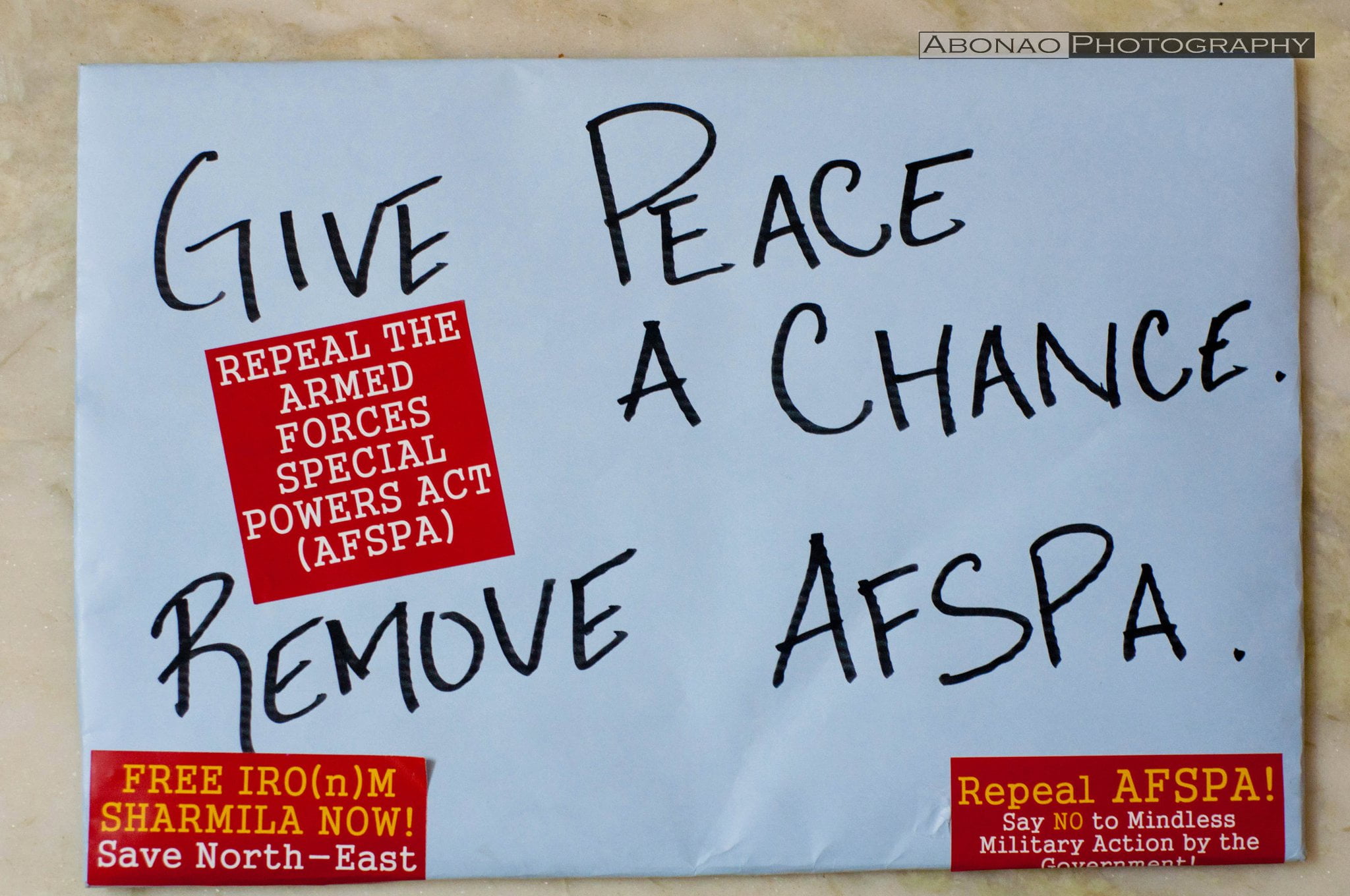Ten innocent civilians were shot dead by the Assam Rifles, an Indian Paramilitary force operating in the state of Manipur at 3 pm on the 2nd of November in the year 2000. One amongst them was a 62-year old woman, Leisangbam Ibetomi, and another was an 18-year old Sinam Chandramani, a 1988 National Child Bravery Award winner who was on his way to tuition. They were waiting at a bus stop.
News spread like wildfire, and a 28 year old began to fast in protest of the killings, refusing to take food and water. 13 years have passed and her spirit still unbent and resolute. Her people have christened her Menghaobi or ‘The Fair One.’ She’s better known as our Iron Lady, born Irom Sharmila Chanu.
Her hunger strike’s sole purpose lies with the repealing of the Armed Forces (Special Powers) Act (referred to as AFSPA henceforth). Long story short, the AFSPA is modelled on the Armed Forces (Special Powers) Ordinance, which was promulgated by the colonial British government on 15 August 1942 to suppress the Quit India Movement. This law grants the military immense powers of arrest, search, the right to shoot to kill, and to occupy a property in counter-insurgency operations. The security forces enjoy virtual impunity for any excesses while exercising these unrestrained powers as no one can be prosecuted without the prior permission of the Central government.
The Indian government has often claimed that its troops need such powers as the army has been deployed to defend the national security, at serious risk from armed combatants, in Kashmir and the North East. But rights activists and victims of the armed forces’ abuse continue to call AFSPA a ‘draconian law’ which is not in conformity with the international laws signed and ratified by India.
“Dozens of men and women are regularly killed by the security forces of Manipur Rifles as well as Commandos of Manipur Police. All such killings have been described as ‘encounters’. In the last 10 years alone, at least 2 individuals per week have been killed,” a note by Mukul Sinha reads. “The allegation is always the same that they belong to some militant group or the other like Kangleipak Communist Party (KCP) and that ‘militants’ were ambushed by the security forces. As per the FIRs filed by the security forces after the encounters, the allegations are almost identical that the ‘militants’ opened fire with 9mm pistols and in self defence, the security forces killed them.
As thousands of young men have died in the last decade, in a desperate bid the young Manipuri widows formed an association and moved the Supreme Court through Human Rights Law Network (HRLN). The Supreme Court was aghast at the enormity of the killings and appointed a high powered commission chaired by former Supreme Court Judge Santosh Hegde and two other members, one being the former Chief Election Commisioner Shri Lyngdoh and the other being former DGP of Karnataka. ”
According to the Armed Forces Special Powers Act (AFSPA), in an area that is proclaimed as “disturbed”, an officer of the armed forces has powers to:
- After giving such due warning, Fire upon or use other kinds of force even if it causes death, against the person who is acting against law or order in the disturbed area for the maintenance of public order,
- Destroy any arms dump, hide-outs, prepared or fortified position or shelter or training camp from which armed attacks are made by the armed volunteers or armed gangs or absconders wanted for any offence.
- To arrest without a warrant anyone who has committed cognizable offences or is reasonably suspected of having done so and may use force if needed for the arrest.
- T o enter and search any premise in order to make such arrests, or to recover any person wrongfully restrained or any arms, ammunition or explosive substances and seize it.
- Army officers have legal immunity for their actions. There can be no prosecution, suit or any other legal proceeding against anyone acting under that law. Nor is the government’s judgment on why an area is found to be disturbed subject to judicial review.
- Protection of persons acting in good faith under this Act from prosecution, suit or other legal proceedings, except with the sanction of the Central Government, in exercise of the powers conferred by this Act.
And finally, moving on to the steps taken to remedy the situation and perhaps lessen the damage :
The Jeevan Reddy Commission :
A five member committee was set up by the Central government under the chairmanship of Justice B P Jeevan Reddy, a former judge of the Supreme Court. This panel was given the mandate of “reviewing the provisions of AFSPA and advising the Government of India whether (a) to amend the provisions of the Act to bring them in consonance with the obligations of the government towards protection of human rights; or (b) to replace the Act by a more humane Act.”
The Reddy committee submitted its recommendations on June 6, 2005. In December 2006, Prime Minister Manmohan Singh declared that the Act would be amended to ensure it was ‘humane’ on the basis of the Jeevan Reddy Commission’s report.
Santosh Hegde commission
A high-power commission headed by the retired Supreme Court judge, Santosh Hegde was constituted in January 2013 to probe six ‘encounter deaths’ in Manipur. The committee, comprising former Supreme Court judge Santosh Hegde and others, has said in its report that the probe showed that none of the victims had any criminal records. The judicial commission set up by the Supreme Court is trying to make the AFSPA more humane, and the security forces more accountable. The committee has suggested fixing a time frame of three months for the central government to decide whether to prosecute security personnel engaged in extra-judicial killings or unruly behaviour in insurgency-hit regions.
The Commission noted that AFSPA was an impediment to achieving peace in regions such as Jammu and Kashmir and the northeast. The commission also said the law needs to be reviewed every six months to see whether its implementation is actually necessary in states where it is being enforced.
Which brings us to the question – When will our Iron Lady eat again?

































